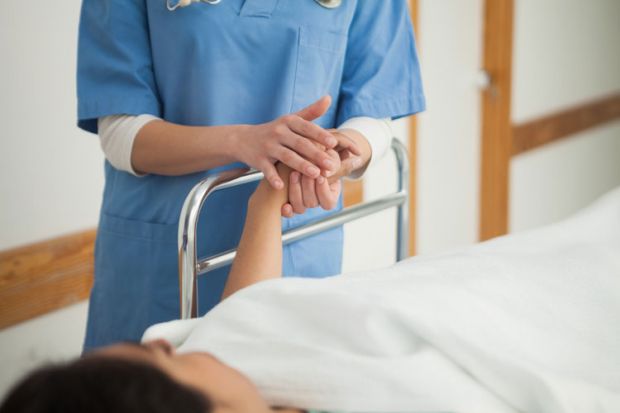In December 1996, before she became the “Domestic Goddess”, Nigella Lawson wrote in the Times that: “Irrelevant academic qualifications are an insult to nurses – and useless to their patients.” As the Nursing and Midwifery Council publishes new standards for UK nurse education, it is timely to revisit this argument about whether the UK has an adequate nurse preparation programme.
The Royal College of Nursing Willis Commission, as well as nursing academics such as Hugh McKenna, David Thompson, Roger Watson and Ian Norman in “The good old days of nurse training: rose-tinted or jaundiced view?”, contend that only degrees can prepare nurses. Indeed, they cite a paper by Linda Aiken et al. that nurses with degrees reduce death rates. And they dismiss disagreement as rose-tinted imaginings of a non-existent golden age: only a degree education can make the nurse “analytical, assertive, creative, competent, confident, computer literate, decisive, reflective, embracers of change and the critical doers and consumers of research”.
While it is not good history to compare nurse preparation in the past with the present because knowledge, skills and requirements inevitably change, it is possible to compare the philosophy behind nurse preparation past and present and raise questions that are still relevant today. As I have shown elsewhere, from the days of Nightingale, preparing the nurse with a high level of scientific and medical knowledge as well as practical skills was as important as inducting the nurse into the praxis of care and compassion. This philosophy resulted in 1923 in a national state syllabus and national practical and theoretical examination.
But the national training was lost when nursing leaders persuaded the reluctant Thatcher government to move nurse education into higher education. They were motivated by a desire to increase the status of the profession – not to improve patient care. This was calculated by the National Audit Office in 1992 as £580 million for extra staff to do work previously done by students (now supernumerary) and £207 million to support colleges introducing the new system. One argument used was to improve recruitment, although this was not actually a problem then. It is now.
Since then, there has been the practice of extending the nursing role into medical and even surgical practice. But, as Geoffrey Rivett points out, UK nurse practitioners are not prepared with skills of diagnosis, examination and treatment, like their US counterparts; instead, nurse practitioner courses are philosophical.
So how are nurses now prepared for their own role as well as their expanded role into medical and surgical practice? How does the degree fit them for this? The current Nursing and Midwifery Council standards introduced in 2010 are generic. Each university implements them in its own way with a variety of assessment methods. The Chief Nurse, giving evidence to the Health Committee in 2013 in the wake of the Francis Report did not know, for example, if or where continence care was taught.
Perhaps it is because of this that the new NMC standards introduced this year list topics to be covered, but these do not include specific diseases, and no details of levels of content, or teaching and assessment methods are given. These standards remain generic. They still lack prescriptive detail despite the Francis Report recommending a national standard of nurse training: “Therefore, nursing training should be reviewed to ensure that sufficient practical elements are incorporated to ensure that a consistent standard is achieved by all trainees throughout the country. This requires national standards.” However, his recommendation seems to have been lost in the reports that followed. Don Berwick, for example, attributed failures of nursing to short staffing, not to variable standards of preparation.
Skills of analysis, assertiveness, creativity and so on, delineated by McKenna et al. do not explain what the nurse knows and does. In fact any other degrees could and do espouse similar skills and qualities. And no degree, as I have argued elsewhere, can inculcate the art of nursing – kindness, care and compassion – that Francis found missing in nurses at Mid Staffordshire and which in 2012 the Chief Nurses listed as requirements. Neither does a nursing degree prepare nurses for an extended medical role, as training is not shared with trainee doctors.
Moreover, as Chris Rust pointed out in Times Higher Education, without shared assessment it is impossible to compare UK degree standards. This clearly relates to the nursing degree, and it calls into question The Lancet study published by Aiken. For in stating that graduate nurses reduce mortality, Aiken et al. do not discuss the comparability and quality of the degrees that these nurses have attained.
Nursing degrees differ not only in the UK but in other countries. North American and many European nursing courses are much more medically focused than those in the UK. So what does the degree contain and how is this measured? How is the knowledge and skill of the graduate nurse tested to ensure, as Francis recommends, a consistent standard is achieved? And, interestingly, how does a modern nursing “degree” differ in the level of knowledge and attainment of nurses prepared under the previous system? Was my own rigorous training at the Radcliffe Infirmary in 1971 a “degree” in reality if not in name?
So the question is not whether nurses should or should not be prepared with a degree, rather it is the deeper question: What is a nursing degree?
Ann Bradshaw is a senior lecturer in adult nursing at Oxford Brookes University
